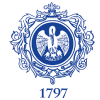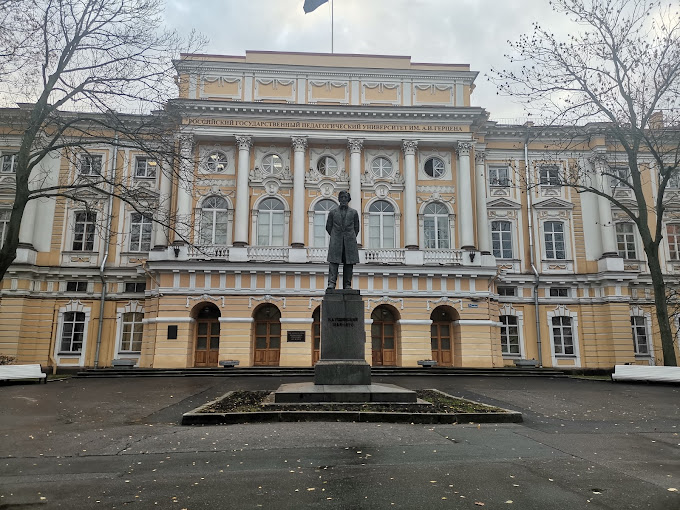48 Moika Embankment, St. Petersburg 191186, Russia
Career Counselling

The Herzen State Pedagogical University of Russia is a center of excellence in higher education located in St. Petersburg, Russia. With a rich history spanning more than two centuries, it is renowned across the world for its teacher training courses in different subjects and is home to over 18,000 students, of whom over 15% are foreign citizens.
The main academic and research divisions at HSPU are seven Faculties (Life Safety, Geography, Philology, Law, Biology, Mathematics, and Chemistry). There are also sixteen Academic Institutes (for example...
| Establishment year | 1797 |
| Total Students | 21,000+ |
| International Students | 3000+ |
| QS World University Rankings 2024 | 1201-1400 |
| Campus Size | N/A |
| Total Number of Campuses | 1 (St. Petersburg) |
| University Website | https://en.hspu.org/ |
| No. of Schools and Divisions | 7 Faculties, 16 Academic Institutes, 5 Research Institutes |
| Nobel Prize Winner Alumni | 0 |
| No. of Education Programs | 76 (undergraduate), 103 (Master’s), 51 (PhD) |
| Student to Faculty ratio | 15:1 |
The Herzen State Pedagogical University of Russia offers undergraduate and postgraduate courses through 7 Faculties, 16 Academic Institutes and 5 Research Institutes. These are further subdivided into 98 Departments.
The 16 Academic Institutes at Herzen University deal with the following disciplines:
Foreign nationals at Herzen University must satisfy the following criteria:
The following steps are part of the application process for international undergraduate applicants:
The process for Master’s and PhD students is similar, with different documents to be uploaded in each case; for certain postgraduate programs, a research proposal is also required.
Undergraduate tuition fees for international students are heavily dependent on the course, and individual faculty pages have more details. Tuition fees vary between 284,200 rubles (~USD 3,500) per year and 516,700 rubles (~USD 6,400) per year.
Postgraduate tuition fees for all courses are 448,900 rubles (~USD 5,500) per year. All tuition fees are substantially lower for Russian citizens, depending on their academic high school and entrance examination scores.
International students have two hotels for accommodations, provided by the university. One of these is next to the campus, while the other is half an hour away via public transport. Despite the fact that both hotels are close to the center of the city and are in the middle of popular tourist areas, the cost for accommodation per month is reasonable; between $90 and $140. This comes to a maximum of $1,400 per year, assuming that ten months are spent on campus. Students must also budget for other living costs, including food, shopping, and travel.

Student life at Herzen University is always vibrant and dynamic, with several social and cultural events on the calendar every month. Some of the highlight events of the year are the Freshman Welcome Day, Graduation Day, Academic Faculty Founding Days, and prominent International Festivals.
There are also many events and competitions organized by student organizations; these range from parties to workshops to projects. Workshops are primarily related to academic disciplines and subjects; for example, Gamification Management and Sociological seminars allow students to learn more about cutting edge topics in their fields of interest that may not be covered in the regular curriculum.
Health and fitness are given special prominence at Herzen University, with more than 25 sports clubs giving students a chance to stay active and meet new people. These are very broad in their scope; from Kyokushin Karate to Ballet Dancing, every discipline is represented.
Many student clubs at HSPU focus on Art Groups. For example, Vogue Theater, Art Support, and the Herzen Center for Singing and Dancing allow students to explore their creative sides. These clubs cater both to students who are experienced in an artistic discipline and to those who wish to try something for the first time in a supportive environment.
Cinema Clubs and Student Theaters allow members of the Herzen University community to come together to share their love of classic films and hone their acting and directing skills, respectively.

Volunteer Organizations at the University bring together students who have a passion for social service. Many of the projects undertaken by these clubs entail making the city of St. Petersburg a better place. In this way, students at Herzen University give back to the local community through a variety of interventions.
Two of the most powerful organizations at the University are the Student Council and the Student Research Association. The Student Council allows students to participate in the governance of the University, and gives them a voice in the organization of events and policy initiatives. The Student Research Association organizes academic competitions, spreads awareness of scholarship programs, and sets up regular seminars and workshops.
The primary model for financial aid for international undergraduate applicants to the University is the Herzen Olympiad for schoolchildren who are foreign citizens. This aims at attracting the best talent to study at Herzen University, and consists of a series of tests with high level questions in six disciplines:
The Olympiad examinations are held in the Russian language, and excellent performers are awarded diplomas of the first, second, or third degree, depending on their performance in relation to other test takers in that year. The highest achievers are given special privileges while applying to the most sought-after programs at Herzen University, and have other special tuition fee rights established by the Government of the Russian Federation.
Scholarship details for Master’s and PhD programs vary according to the course of interest, and can be found on the individual program pages corresponding to each Faculty and Department.
